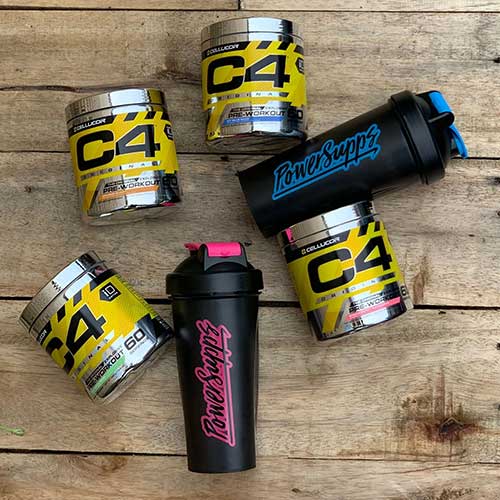Nutrition, Supplements
Can Pre Workout Cause Blood in Stool? How to Prevent it!
There’s no denying the power of a good pre-workout supplement. It can give you the energy you need to push through intense workouts and reach your fitness goals faster. But there are some potential side effects that you might not be aware of.
One question we often get is, “Can pre workout cause blood in stool?” Let’s dive into this topic to provide you with some clarity.
Is It Possible for Pre Workout to Cause Blood in Stool?
While it’s rare, certain ingredients in pre workout supplements could potentially contribute to gastrointestinal issues, such as diarrhea or constipation. These problems might lead to blood being present in the stool in individuals with preexisting problems such as hemorrhoids. However, it’s important to note that there could be various factors at play, and it’s crucial to consult with a healthcare professional if you notice such symptoms.
What Are Some Pre Workout Ingredients That May Cause Blood in Stool?
Everyone’s body responds differently, and certain ingredients may cause digestive issues in some people. While it’s not common, here are some pre-workout ingredients that could potentially lead to blood in the stool:
Caffeine
A staple in most pre-workout supplements, caffeine keeps you alert and promotes good muscle pump. However, excessive intake may cause jitteriness, an accelerated heart rate, stomach discomfort, and in rare instances, digestive complications such as diarrhea, potentially leading to hemorrhoidal irritation and blood in the stool (1).
Sodium Bicarbonate
Known as baking soda, it helps delay muscle fatigue during high-intensity exercises by buffering lactic acid. Too much, though, can cause water retention within the digestive system, bloating, nausea, vomiting, and diarrhea (2). As mentioned, this rarely may lead to bloody stool.
Magnesium
Crucial for muscle contraction, nerve function, and energy production. Overconsumption could act as a laxative, causing diarrhea, which, if severe, could lead to blood in the stool (3).
Niacin (Vitamin B3)
Niacin aids in converting food into energy and increases blood flow by dilating blood vessels. Large doses may cause flushing, itching, and, rarely, gastrointestinal issues, including bloody stool. Moreover, niacin can also prolong bleeding time, further increasing the risk of hemorrhoid problems or other digestive issues associated with blood in stool (4)
Arginine
An amino acid that improves blood flow to muscles during workouts by producing nitric oxide. Some might experience stomach discomfort or diarrhea, and in severe cases, this could result in blood in the stool.
Bear in mind that everyone’s body responds differently to taking pre-workout supplements. If you experience high blood pressure, abdominal pain, or other side effects of pre-workouts, consult with a healthcare professional immediately.
Other Factors That Can Cause Blood in Stools
While pre workout ingredients could potentially cause digestive issues, there are other factors, particularly related to gym habits, that could contribute to this issue:
Pre-Workout
- Dehydration: Before you even step foot in the gym, hydration is crucial. Not drinking enough water can lead to constipation, which might cause straining during bowel movements and result in rectal bleeding. Always make sure you’re well-hydrated before hitting the weights!
- Improper Diet: Loading up on protein bars and skipping fiber-rich foods? This could lead to constipation, irritate pre existing hemorrhoids and potentially cause blood in your stool. A balanced diet, including plenty of fruits, vegetables, and whole grains, can help maintain regular bowel movements.
During Workout
- Overexertion: Pushing yourself too hard during a workout can sometimes lead to gastrointestinal issues. Overexertion can increase pressure in your abdomen, which might cause hemorrhoids or anal fissures, both of which can lead to bloody stools.
- Heavy Lifting: Heavy lifting increases intra-abdominal pressure, which can exacerbate existing hemorrhoids and cause them to bleed. If you’re prone to hemorrhoids, consider modifying your workout routine accordingly.
Post-Workout
- Ignoring the Call of Nature: Holding in a bowel movement after a workout can lead to constipation and straining, which might result in blood in the stool. When nature calls, it’s best to listen.
What Are Some Tips for Helping Prevent Blood in Stools While Taking Pre Workout?
Here are some tips to help maintain a healthy digestive system while taking pre workout:
1. Stay Hydrated
Water is a gym-goer’s best friend. Not only does it keep you refreshed during your workout, but it also helps prevent constipation which could lead to rectal bleeding. So, remember to drink plenty of water before, during, and after your workouts.
2. Balance Your Diet
Pair your pre-workout supplement with a balanced diet. Ensure you’re getting enough fibre from fruits, vegetables, and whole grains to maintain regular, healthy bowel movements.
3. Mind Your Dosage
Supplements can be beneficial, but too much of a good thing can cause problems. Stick to the recommended dosage on the package and consult with a healthcare professional if you’re unsure.
4. Listen to Your Body
If you notice any discomfort or side effects after taking your pre-workout supplement, don’t ignore it. Your body knows best. It might be a sign that you need to adjust your dosage or switch to a different supplement.
5. Regular Check-ups
Regular health check-ups can help identify any potential issues before they become serious. If you’re regularly taking supplements and working out hard, it’s a good idea to get regular screenings.
Can Taking a Pre Workout Supplement Cause Blood in Stool? Our Final Wrap Up
While certain pre workout ingredients could potentially cause digestive issues, it’s important to remember that everyone’s body reacts differently to supplements. If you notice blood in your stool after taking a pre workout, it’s crucial to consult with a healthcare professional.
Remember to use supplements responsibly, stay hydrated, and maintain a balanced diet to support overall digestive health.
References:
- Brown SR, Cann PA, Read NW. Effect of coffee on distal colon function. Gut. 1990 Apr;31(4):450-3. doi: 10.1136/gut.31.4.450. PMID: 2338272; PMCID: PMC1378422.
- Kahle LE, Kelly PV, Eliot KA, Weiss EP. Acute sodium bicarbonate loading has negligible effects on resting and exercise blood pressure but causes gastrointestinal distress. Nutr Res. 2013 Jun;33(6):479-86. doi: 10.1016/j.nutres.2013.04.009. Epub 2013 May 17. PMID: 23746564; PMCID: PMC3680785.
- Costello R, Wallace TC, Rosanoff A. Magnesium. Adv Nutr. 2016 Jan 15;7(1):199-201. doi: 10.3945/an.115.008524. PMID: 26773023; PMCID: PMC4717872.
- Djadjo S, Bajaj T. Niacin. [Updated 2023 Mar 20]. In: StatPearls [Internet]. Treasure Island (FL): StatPearls Publishing; 2023 Jan-. Available from: https://www.ncbi.nlm.nih.gov/books/NBK541036/

